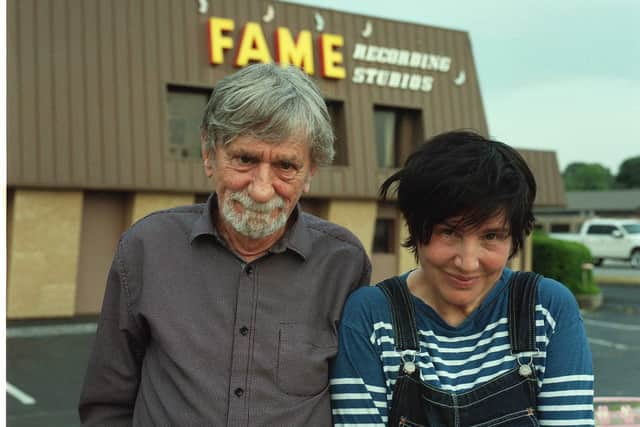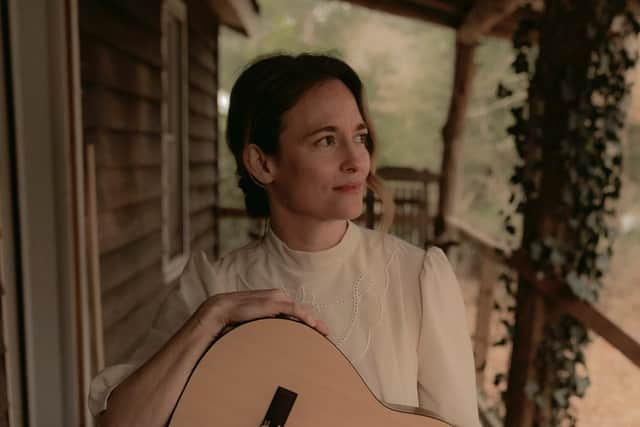Album reviews: Texas & Spooner Oldham | Adrianne Lenker | Dawn Landes
Texas & Spooner Oldham: The Muscle Shoals Sessions (PIAS) ****
Adrianne Lenker: Bright Future (4AD) ****
Dawn Landes: The Liberated Woman’s Songbook (Fun Machine Music) ****
Advertisement
Hide AdAdvertisement
Hide AdThe FAME Recording Studio in Muscle Shoals, Alabama, is a sacred place for music. It was here in January 1967 that Aretha Franklin turned around her career, cutting I Never Loved A Man (The Way That I Love You). Present at the session and instrumental in creating the hit arrangement was pianist and songwriter Spooner Oldham, whose electric piano bleeds the Memphis sound.
Sharleen Spiteri is wise to this southern soul lore and you can feel her rapture at recording as Texas & Spooner Oldham on his turf. He is not a showy player; rather he is all about the vibe, which is in full effect on this selection of Texas tracks reworked in that so-southern style.
In most cases, the songs respond well to stripped-back treatment. Everyday Now aches so good, and The Conversation ups its natural groove. However, the simple piano and vocals arrangement of Let’s Work It Out is really missing the original’s funkiness.
Halo is instantly transported by the warm tones of Wurlitzer with a tight cadre of gospel backing vocalists cooing in awe and wonder that “she has a halo, can we touch her?” Summer Son is divested of its Abba chimes but gains in yearning sincerity, while Oldham provides a direct line to the soulful heart of Say What You Want.


Three covers are also slipped into the mix. The Drifters’ Save the Last Dance feels a little karaoke but Spiteri is well suited to Charles & Eddie’s Would I Lie To You and Oldham’s own delightful Keep On Talking, given her natural affinity with soul, southern, northern or otherwise.
Big Thief frontwoman Adrianne Lenker also breathes in some special surroundings on her latest solo album, inviting three musician friends – pianist Nick Hakim, violinist Josefin Runsteen and multi-instrumentalist Mat Davidson – to collaborate and record with her in isolated old analogue studio Double Infinity. Together, they make a timeless sound with an intimate front porch feel.
Recent single Sadness As a Gift sounds like a wistful old classic, while the spindly fiddle on Evol, the gorgeous fuzzy piano and Lenker’s pure folk voice, sounding exposed on Real House (“31 and I don’t feel strong”) and the quiet, natural harmonising on Free Treasure are beamed in from another era.
Advertisement
Hide AdAdvertisement
Hide AdVampire Empire has beseeching bluegrass blood, while Donut Seam exudes an evergreen environmental potency as Lenker suggests that “don’t it seem like a good time for swimming before all the water disappears”. Ruined, on the other hand, could easily be a Taylor Swift or Rihanna number given some old time folk medicine.


As the US administration turns the clock back on women’s rights, indie folk musician Dawn Landes sings from the Liberated Women’s Songbook, offering sleek interpretations of female-centric songs, chosen from the 1971 publication of the same name, which she discovered during lockdown.
Landes delivers the songs in chronological order, from 1830 through to 1970, from traditional ballad Hard Is the Fortune of All Womankind, recorded in the 20th century by Peggy Seeger and Joan Baez, to the witty hippy ditty There Was a Young Woman Who Swallowed a Lie, which redraws the kid’s rhyme There Was an Old Lady Who Swallowed a Fly.
Renowned activist anthems Which Side Are You On and Bread and Roses are simply, effectively rendered while the country sweetness of Landes’ voice is at odds with the bitter fruit of the lyric on Keep Woman In Her Sphere. Most sobering of all is One Hundred Years, dating from 1852, which looks to the future with a now-wry wishlist for a time when “oppression and war will be heard of no more.”
CLASSICAL
Stainer: The Crucifixion (Delphian) ****
Stainer’s The Crucifixion is very much of its time: an anglicised 19th century concision of Bach’s Baroque Passion ideal, flavoured with Victorian nostalgia, practical and accessible through its relative simplicity and economical organ accompaniment. Often maligned as such, it does, in the right hands, possess a comforting charm and seamless accomplishment, proven here in fluid, reassuring terms by the Choir of St Mary’s Episcopal Cathedral, Edinburgh under music director Duncan Ferguson, with organist Imogen Morgan and soloists Liam Bonthrone (tenor) and Arthur Bruce (baritone). The St Mary’s organ, still with much of its original Willis voicing, is perfect cushioning, with liquid string stops and mild-roasted reeds that are aptly illustrative and supportive. Bonthrone and Bruce elicit heat where drama is needed, even schmaltz where Stainer veers towards Gilbert and Sullivan, but ever cognisant of interpretative aims. While honouring this music’s artful Victorian equilibrium, this is a performance that usefully refreshes it. Ken Walton
JAZZ
Jonny Mansfield: Quartet! Live at Pizza Express (Resonant Postcards) ****
This latest album from the Kenny Wheeler Jazz Prize-winning vibraphonist Jonny Mansfield catches him in inspired live performance with pianist Will Barry, double-bassist Will Sach and drummer Luke McCarthy, a well-honed quartet generating adventurous, at times hectically shape-shifting but essentially organic improvised music. Mansfield’s vibes lace through these exchanges like a glistering thread, right from the opener, Flicker, with keen piano interludes taking flight from intense churning before a suddenly serene conclusion; similarly Rival, with islands of calm between instrumental storms. The stately, Bach-like processional of Joy Tears has vibes and piano chiming together over thoughtful drum patterns. The real epic, however, is a reworking of (Organise) The Air In Front Of You, the title tune of Mansfield’s last album, with its melodic unfolding, pianistic flourishes subsiding for the vibes to embark on adventures of their own before a jubilant resolution. Jim Gilchrist